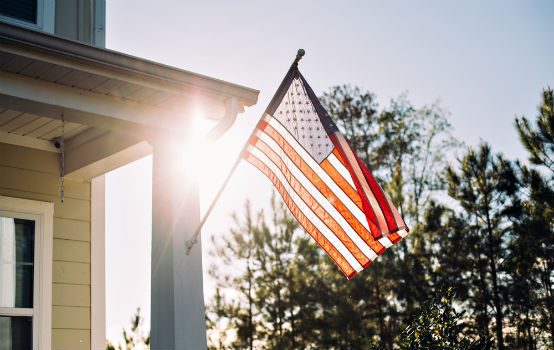Remembering the Original Meaning of the American Dream

In the 1999 film Fight Club, Tyler Durden addresses what he sees as the problem with the American Dream. “We’ve all been raised on television to believe that one day we’d all be millionaires and movie gods and rock stars,” he says. “But we won’t. And we’re slowly learning that fact. And we’re very, very pissed off.”
Perhaps if Durden and his gang of angst-ridden males—as well as the rest of us—had paid more attention to the historical origins of one of America’s most famous expressions, we might not feel so aggrieved.
The phrase “American Dream” was originally coined in the wake of the Great Depression by historian James Truslow Adams, when he wrote a book titled The Epic of America. (He originally called it The American Dream, but his publishers didn’t think the title catchy enough.)
“For Adams, the American dream included, but extended beyond, economic opportunity,” says Sarah Churchwell, a professor of American literature at the University of London and author of Behold, America: A History of America First and the American Dream. “It was about militating against privilege, rather than promising that everyone could be rich.”
Adams was no socialist, Churchwell notes, though he hoped capitalism could produce a more beneficent order, with businessmen considering the good of society as they salvaged their post-Depression livelihoods, discovering enlightened self-interest and paying better—an earlier version of today’s corporate social responsibility.
Adams’ ideas and writings about the American Dream found favor in a nation trying to rebuild after economic catastrophe. His phrase took off during the 1930s, when it was used to proselytize for the likes of state-subsidized education, national health care, and public housing (reading that as a Brit makes my heart swell—you maddening yet lovable American rogues once saw the light!).
Nowadays, the phrase’s original ideals seem long forgotten. Current invocations of the American Dream focus almost exclusively on acquisition, better material prospects, landing a juicy advertising deal with your Instagram or YouTube account.
The result has been a failing society where people focus on themselves and their advancement and ignore the struggles of others. Thus has the phrase American Nightmare found its place in debates about what’s gone wrong.
This collective amnesia about what the American Dream originally meant is troubling for Americans and foreigners alike. It was the BBC’s legendary America correspondent Alistair Cooke who noted that where America goes, Britain usually follows.
I see this whenever I return to the UK from the States, often in benign ways, such as fashion, food, and language trends. But I also see more troubling aspects: enthrallment to the profit motive and the elevation of self-fulfillment above service to the greater good.
Indeed, it seems no coincidence that increasing numbers of British voices are questioning the feasibility of keeping our National Health Service publicly funded. And of course, America isn’t a trendsetter for the UK alone.
It is arrogant and naïve for those in Europe to adopt an attitude of, well, we can leave those Americans to their own devices. There are big implications for pretending the world doesn’t need America, from the current wrangling over the future of NATO to the sustainability of the world order we’ve largely benefited from since the end of World War II.
Yet there’s also a striking similarity between the aftermath of the Great Depression and what followed the financial crisis of 2007 and 2008. By 1931, it was clear that many of America’s wealthiest had escaped the depression unscathed. Sound familiar?
The New Deal reforms of Franklin Delano Roosevelt in 1933 sought to rectify this injustice. But where have the reforms been since 2008? Instead a more ruthless form of capitalism has taken hold unchecked. A small group of individuals continue to do extremely well, while the majority languishes.
“I see all this potential, and I see squandering. God damn it, an entire generation pumping gas, waiting tables—slaves with white collars,” Durden fumes. “We’re the middle children of history, man. No purpose or place. We have no Great War. No Great Depression. Our Great War’s a spiritual war. Our Great Depression is our lives.”
His character was well written and deserves our attention. The consequences of an increasingly amoral and unfair—and hence unhappy—society flailing around a demagnetized moral compass point are horribly tangible, and not just in America.
Studies indicate that the greatest cause of death in young people under 30 in the developed world is not the abuse of drugs or alcohol but suicide.
The reasons for this poor state of mental health are myriad and complex. However, as Hugh Mackay, the Australian psychologist and social researcher, argues in his book The Good Life, happiness has become an industry that is selling us a lie.
The current misappropriation of the American Dream has fed into this, equating happiness with material gain. It’s increasingly evident that equation doesn’t work.
As dissatisfaction soars, populist parties and movements, mostly on the Right, are becoming a powerful force in both the United States and Europe. Democracy itself appears tarnished and suspect. But at least we can click on Amazon.com for same-day delivery or switch on Netflix for instant gratification and escapism.
“We have lost the power even of imagining what the ancient idealization of poverty could have meant: the liberation of material attachments, the unbribed soul,” wrote American philosopher William James, “the more athletic trim, in short, the moral fighting shape.”
That was written at the turn of the 20th century. The trajectory since then appears worryingly to have been sustained. America needs to remember what the dream originally meant—but perhaps more importantly, it needs to get back into moral fighting shape.
James Jeffrey is a freelance journalist who splits his time between the Horn of Africa, the U.S., and the UK, and writes for various international media. Follow him on Twitter @jrfjeffrey.